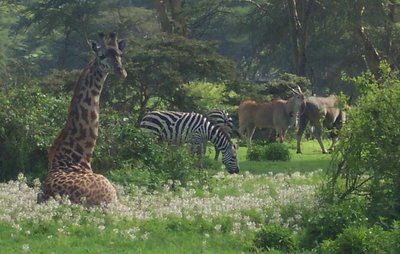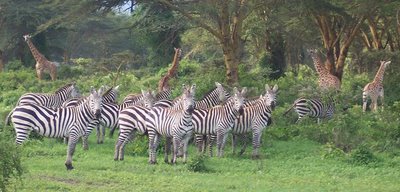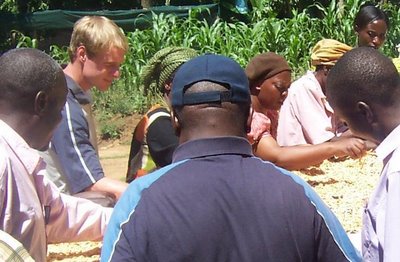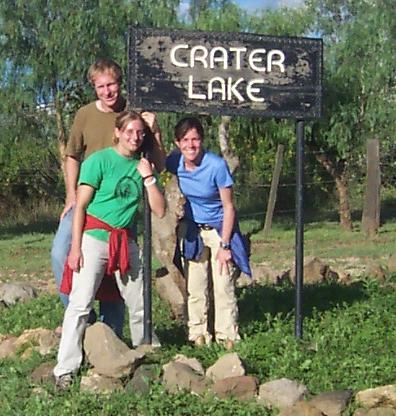The latest and greatest and new and improved BIGGER pictures!
The last week has been productive, with plenty of time spent on Sweet Potato Value addition training for the farmers. The training is a good thing because its the first step towards the goals of the grant proposal I worked on several months ago. I was recently told by a contact in Nairobi that we have cleared the final hurdle in being approved for the funds and the money should arrive in July.
Now from the training, about 80 farmers are experts on drying chips for creating flour, and also making juice, chapattis, cakes, donuts, sweet potato onion bites, greens (from sweet potato leaves), etc. In fact, I had basically become a sweetpotatoarian for the last week and it’s nice to finally have a breather, but training for even more farmers will continue again in a few weeks. Things got a little shaky with Rhoda, who is a sweet potato value addition expert from the Kenya Agricultural Research Institute. She has a reputation for being very slippery but I finally convinced her to lead the classes. She gave us a long and detailed list of the exact materials and ingredients she wanted to have and because this is Kenya there were some issues in getting the entire list of items together in time. Luckily, with some last minute panic purchases and the quick assembly of a proper drying rack, we were able to keep Rhoda happy and complete the course work. Habakkuk compared Rhoda to “riding a bicycle with trays of eggs on the back”, in that you have to be very careful with every move you make around her. He’s absolutely right and I think the analogy is hilarious. I really get along well with Rhoda though. I have a lot of respect for African women living in a male dominated society that don't take any crap. She’s not a pushover and doesn’t put up with people wasting time or doing things in a way she doesn’t agree with. Furthermore, she’s very intelligent and her opinion is respected enough that she can get away with it.
After our training we had a visitor from an FAO employee working in Mali. The Kakamega FFS network has become a benchmark for other Farmer Field Schools, and, for better or worse, much of our time is spent showing visitors around. She was a Dutch women named Susan who has lived in Mali for the past few years and she gave me the contact information of her boss, who is living in Rome as the supervisor for FAO West Africa. He was in the Peace Corps and is an American and I am very excited about the opportunity to meet him. More on that in a moment.
Life in Mali is very different from Kenya. According to Susan there is about a 20% literacy rate and the poverty is even more extreme than here. From what I gathered Mali consists of many nomadic tribes living in a scorching hot desert so they have a valid excuse for being so poor. Using irrigation and teaching proper farming practices, Susan is helping reduce the level of poverty in Mali, and her job sounds very tough and rewarding. We showed Susan several field schools and there was the usual singing and dancing and lots of sweet potato products to eat. As usual I had garland placed over my neck as a “guest of honor”. The novelty has definitely worn off.
Next week will be cram-packed with visitors yet again. On Monday there will be nearly 30 people from India who have flown to Kenya just to visit the Farmer Field Schools here, and it has been a challenge to find ways to handle such a large crowd. On Tuesday we have visitors yet again as well as a Loans Committee meeting, followed by an Agricultural Trade Show Thursday and Friday. Hopefully I can actually use Wednesday to catch up on a few things.
Now back to meeting this FAO supervisor. The FAO headquarters is located in Rome, Italy. My parents had initially planned to visit me in August. Unfortunately, things came up preventing them from making it at that time and last month they informed me they could possibly arrive in May instead. Soon afterwards my sister, who has just graduated college, decided she wanted to come as well. May was the only month that would work for everyone, but by then we were very short on time. Tickets, vaccinations, passports, visas, and the costs of last minute travel became an issue, and my parents decided to visit me next year (with more adequate preparation time) instead. Meanwhile they want to see me and celebrate my sisters graduation, and I will meet them in Rome for a week. While there I’m also going to visit the FAO headquarters, which works out well because I don’t have to use as much vacation time, since part of the trip is work related, plus I will meet people who may prove useful if I decide to make a career out of what I am doing now. I can’t say that at this point in time my long-term aspirations are geared toward agricultural sustainability work in third world countries, but then again I’m not sure what my long-term aspirations are and it’s always good to keep my options open.
Oh, I almost forgot. I just finished a very interesting book called “Guns, Germs, and Steel”. In 400 pages, it basically sums up the entire history of human development over the past 13,000 years and does a fantastic job explaining why societies have developed into the “haves” and “have nots” that we see today, while disproving any racial theories. I highly recommend it to anyone who might find this kind of thing interesting. A really good fiction I just finished is “Life of Pi”. It’s about a kid stranded on a lifeboat with a Bengal Tiger, a Hyena, a Zebra, and a Baboon. I want to sit down soon and tally up all the books I’ve read since I got here before I start forgetting. I think I’m averaging over a book a week now.
So that’s enough rambling. To make up for it here’s some pictures from the last few weeks:
 Here we are in Sweet Potato training learning to cook greens (surprisingly tasty) from the leaves of sweet potato vines. That's Rhoda with the brown cap amd elephant print dress leading the class.
Here we are in Sweet Potato training learning to cook greens (surprisingly tasty) from the leaves of sweet potato vines. That's Rhoda with the brown cap amd elephant print dress leading the class.
Now from the training, about 80 farmers are experts on drying chips for creating flour, and also making juice, chapattis, cakes, donuts, sweet potato onion bites, greens (from sweet potato leaves), etc. In fact, I had basically become a sweetpotatoarian for the last week and it’s nice to finally have a breather, but training for even more farmers will continue again in a few weeks. Things got a little shaky with Rhoda, who is a sweet potato value addition expert from the Kenya Agricultural Research Institute. She has a reputation for being very slippery but I finally convinced her to lead the classes. She gave us a long and detailed list of the exact materials and ingredients she wanted to have and because this is Kenya there were some issues in getting the entire list of items together in time. Luckily, with some last minute panic purchases and the quick assembly of a proper drying rack, we were able to keep Rhoda happy and complete the course work. Habakkuk compared Rhoda to “riding a bicycle with trays of eggs on the back”, in that you have to be very careful with every move you make around her. He’s absolutely right and I think the analogy is hilarious. I really get along well with Rhoda though. I have a lot of respect for African women living in a male dominated society that don't take any crap. She’s not a pushover and doesn’t put up with people wasting time or doing things in a way she doesn’t agree with. Furthermore, she’s very intelligent and her opinion is respected enough that she can get away with it.
After our training we had a visitor from an FAO employee working in Mali. The Kakamega FFS network has become a benchmark for other Farmer Field Schools, and, for better or worse, much of our time is spent showing visitors around. She was a Dutch women named Susan who has lived in Mali for the past few years and she gave me the contact information of her boss, who is living in Rome as the supervisor for FAO West Africa. He was in the Peace Corps and is an American and I am very excited about the opportunity to meet him. More on that in a moment.
Life in Mali is very different from Kenya. According to Susan there is about a 20% literacy rate and the poverty is even more extreme than here. From what I gathered Mali consists of many nomadic tribes living in a scorching hot desert so they have a valid excuse for being so poor. Using irrigation and teaching proper farming practices, Susan is helping reduce the level of poverty in Mali, and her job sounds very tough and rewarding. We showed Susan several field schools and there was the usual singing and dancing and lots of sweet potato products to eat. As usual I had garland placed over my neck as a “guest of honor”. The novelty has definitely worn off.
Next week will be cram-packed with visitors yet again. On Monday there will be nearly 30 people from India who have flown to Kenya just to visit the Farmer Field Schools here, and it has been a challenge to find ways to handle such a large crowd. On Tuesday we have visitors yet again as well as a Loans Committee meeting, followed by an Agricultural Trade Show Thursday and Friday. Hopefully I can actually use Wednesday to catch up on a few things.
Now back to meeting this FAO supervisor. The FAO headquarters is located in Rome, Italy. My parents had initially planned to visit me in August. Unfortunately, things came up preventing them from making it at that time and last month they informed me they could possibly arrive in May instead. Soon afterwards my sister, who has just graduated college, decided she wanted to come as well. May was the only month that would work for everyone, but by then we were very short on time. Tickets, vaccinations, passports, visas, and the costs of last minute travel became an issue, and my parents decided to visit me next year (with more adequate preparation time) instead. Meanwhile they want to see me and celebrate my sisters graduation, and I will meet them in Rome for a week. While there I’m also going to visit the FAO headquarters, which works out well because I don’t have to use as much vacation time, since part of the trip is work related, plus I will meet people who may prove useful if I decide to make a career out of what I am doing now. I can’t say that at this point in time my long-term aspirations are geared toward agricultural sustainability work in third world countries, but then again I’m not sure what my long-term aspirations are and it’s always good to keep my options open.
Oh, I almost forgot. I just finished a very interesting book called “Guns, Germs, and Steel”. In 400 pages, it basically sums up the entire history of human development over the past 13,000 years and does a fantastic job explaining why societies have developed into the “haves” and “have nots” that we see today, while disproving any racial theories. I highly recommend it to anyone who might find this kind of thing interesting. A really good fiction I just finished is “Life of Pi”. It’s about a kid stranded on a lifeboat with a Bengal Tiger, a Hyena, a Zebra, and a Baboon. I want to sit down soon and tally up all the books I’ve read since I got here before I start forgetting. I think I’m averaging over a book a week now.
So that’s enough rambling. To make up for it here’s some pictures from the last few weeks:
Here I am at the entrance to Crater Lake park with two PCV's, Shelia and Adrienne. It may appear that we started here from the pic, but our guide tried sneaking us into the park from the lake and we had to walk back to the gate to pay the entrance fee
 So there is wildlife in Kenya if you know where to find it! In Crater Lake game park you can walk right by it without being in a vehicle. How cool is that? The long-necked animal in front is called a Giraffe, those stipey horse things are known as zebra, and I forgot what the ginormous antelope-type animals in the back are called.
So there is wildlife in Kenya if you know where to find it! In Crater Lake game park you can walk right by it without being in a vehicle. How cool is that? The long-necked animal in front is called a Giraffe, those stipey horse things are known as zebra, and I forgot what the ginormous antelope-type animals in the back are called.
 A typical view from the park. I have about a hundred pics but I'll spare you with just a few.
A typical view from the park. I have about a hundred pics but I'll spare you with just a few.
 Here we are in Sweet Potato training learning to cook greens (surprisingly tasty) from the leaves of sweet potato vines. That's Rhoda with the brown cap amd elephant print dress leading the class.
Here we are in Sweet Potato training learning to cook greens (surprisingly tasty) from the leaves of sweet potato vines. That's Rhoda with the brown cap amd elephant print dress leading the class. Here's another pic from the same day of training. Here we have the potatoes chipped and they are being dried on a rack before being ground into flour.
Here's another pic from the same day of training. Here we have the potatoes chipped and they are being dried on a rack before being ground into flour.


<< Home